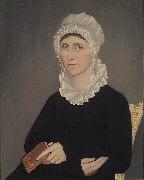Wholesale Oil Painting No Minimum |
|||||||||||
|
|
|||||||||||

|
|||||||||||
|
|
|
||||||||
Ammi Phillips(1788-1865), a self-taught New England portrait painter, is regarded as one of the most important folk artists of his era. Phillips was born in Colebrook, Connecticut, and began painting portraits as early as 1810. He worked as an itinerant painter in Connecticut, Massachusetts, and New York for five decades. In 1924, a group of portraits of women, shown leaning forward in three-quarter view and wearing dark dresses, were displayed in an antique show in Kent, Connecticut. The anonymous painter of these strongly colored works, which dated from the 1830s, became known as the "Kent Limner," after the locality where they had come to light. Stylistically distinct from those of the "Kent Limner," a second group of early-19th-century paintings emerged after 1940 in the area near the Connecticut?CNew York border. Attributed at the time to an unknown "Border Limner," these works, dating from the period 1812?C1818, were characterized by soft pastel hues, as seen in the portrait of Harriet Leavens, now in the Fogg Art Museum, Harvard University. It was not until 1968 that Ammi Phillips's identity as the painter of both groups of portraits was established. Additional works were identified, showing the artist's transition from the delicate coloration of the Border period to the bold and somber works that followed. |
||||||||
|
|
||||||||
Betsey Beckwith
Betsey Beckwith Painting ID:: 71236 |
between 1815(1815) and 1820(1820)
Oil on canvas
77.4 x 62.4 cm (30.47 x 24.57 in)
between 1815(1815) and 1820(1820) Oil on canvas 77.4 x 62.4 cm (30.47 x 24.57 in) |
|||||||
|
|
||||||||
|
Phillips, Ammi American Folk Artist, 1788-1865 American painter. Apparently self-taught, he began his prolific and successful career as a portrait painter c. 1811. During his lifetime, he moved several times across the borders of New York, western Connecticut and Massachusetts in search of commissions. Like many of the itinerant artists of the 19th century, he struggled to achieve pictorial solutions and a distinctive style, yet he developed so dramatically that historians originally classified his paintings as the work of two different artists: 'The Border Limner' and 'The Kent Limner'. The earliest works, from his 'Border' period (c. 1812-19), are marked by simple forms, shaded outlines and soft, pastel colours. They include ambitious full-length portraits as well as three-quarter and bust-length examples (Dr Russell Dorr, c. 1814-15; Williamsburg, VA, Rockefeller Flk A. Col.). In the 1820s he experimented with techniques and formats, developing an attention to detail and naturalism that suggests the influence of Albany portrait painter Ezra Ames. By the 1830s, the decade of his 'Kent' portraits, his compositions present his sitters as large, stylized shapes that nearly fill the canvas, while his use of rich, saturated colours creates striking contrasts of light and dark. Typically in this decade, his female sitters are shown leaning forward while male sitters sit upright with one hand draped over a chairback. Among his most appealing and successful works are portraits of children from this period. Blond Boy with Primer, Betsey Beckwith Date between 1815(1815) and 1820(1820) Medium Oil on canvas Dimensions 77.4 X 62.4 cm (30.47 X 24.57 in) cyf |
||||||||
|
|
||||||||
|
Prev Next
|
||||||||
|
|
||||||||
|
Related Paintings to Phillips, Ammi :. |
||||||||
|
|
||||||||
|
CONTACT US |

